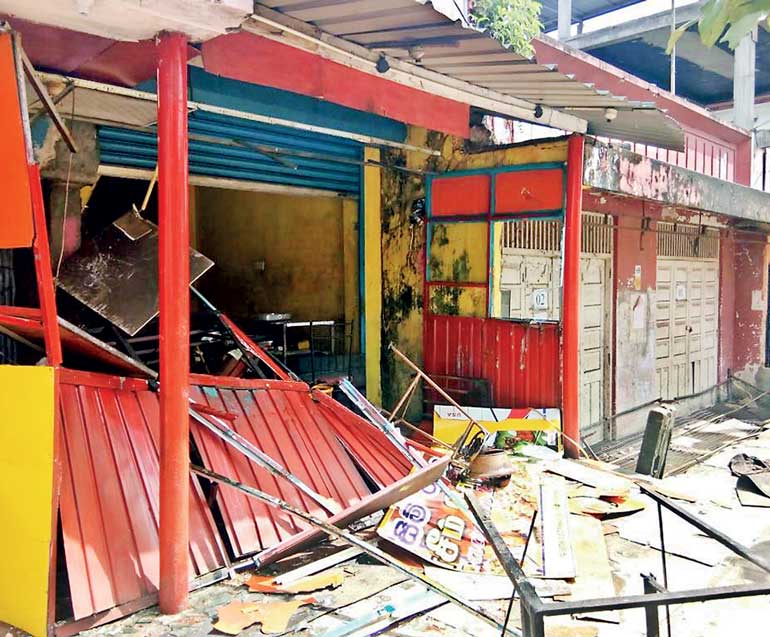Thursday Feb 19, 2026
Thursday Feb 19, 2026
Tuesday, 6 March 2018 00:00 - - {{hitsCtrl.values.hits}}

As long as our Government chooses to remain complacent about the severity of far-right extremism that emanates from the different ethno-religious groups, it becomes extremely difficult to curb the threat
The recent attacks in Ampara were perpetrated reportedly based upon a canard that continues to re-surface from time to time. While this piece refrains from divulging into the details of the rumours and how the said chain of events transpired, such acts of violence undoubtedly warrant utmost condemnation and swift investigation and legal action against the perpetrators.
The incident was discussed the following day at the weekly Cabinet meeting, raising concerns over escalating tensions between the Muslim and Sinhalese communities, in particular with regard to Police inaction during attack.
Ministers Rauff Hakeem, Mano Ganesan, Daya Gamage and Rishard Bathiudeen condemned the violence and urged the government to ensure that action is taken against the culprits for inciting communal violence. Separately, Opposition Leader R. Sampanthan issued a media statement condemning the attacks, and President Maithripala Sirisena was quoted stating that such incidents are detrimental to reconciliation in the country.
Unfortunately, there is a disturbing tendency in our country to continue treating such attacks as isolated incidents perpetrated by angry mobs, rather than seeing them as a part of a larger pattern of violent extremism that prevails in the country.
Politicos and media reports often describe such events as ‘incidents’, ‘attacks’, ‘clashes’, and ‘tense situations’ orchestrated by ‘angry mobs’. Simply and boldly put, what transpired in Ampara is a clear-cut case of hate crime driven by extremists.
It baffling as to why, still at this point, the State leaders and senior officials are reluctant to publically and explicitly declare such attacks as a hate crime. How many more incidents fuelled by different ethno-religious groups would it take to accept that Sri Lanka faces the threat of far-right extremism?
It is high time that the State adopts the accurate terminology to describe the prevailing circumstances, and to muster the courage to label the incident for what it really is. At this juncture, it is imperative that we examine beyond the scope of the particular incident, and examine the greater security implications to the ‘politics of labelling’.
Right-wing extremism in Sri Lanka
Following the annihilation of the violent Tiger terrorists, Sri Lanka’s security vacuum was replaced by the re-emergence of ultranationalist rhetoric from all fronts, as well as politicisation of faiths. Essentially, we witnessed the interplay of ethno-religious fascist movement against minority groups, and the growth of radical extremism among the minority groups.
While the ultra-nationalist Sinhala Buddhist groups have been hitting the headlines for hate speech and actively inciting communal disharmony, there is also reportedly a rise of hardline Salafi sectarian groups, as well as the birth of Siva Senai, Sri Lanka’s first Hindu right-wing organisation in 2016.
The previous Government is being accused for tacitly supporting anti-Muslim attacks, but the incumbent regime is yet to respond accordingly due to its unwillingness to declare the incident as hate crimes, and failing to accept that right-wing extremism is a national security threat prevailing in the country.
Generally speaking, following communal clashes we see only politicos of the minority ethnicity raising concerns, and the state leaders and senior officials tend to shy away from explicitly condemning the hate crime in the strongest terms.
Reactions elicited from the latter, if any, fall under one or more of the three categories: a) vague in nature; b) urging the authorities to apprehend those responsible as an answer; c) blaming opposing political forces for the attacks.
Today, there is still a general lack of acceptance at the State level that hate crime fuelled by right-wing extremism (regardless of the ethno-religious background) is a legitimate security concern for Sri Lanka. While several arrests made last year is commendable, it is inadequate in addressing the larger issue at hand.
Why semantics matter
The contentious politics of labelling is a tricky business, especially for politicians. Language and semantics is a double-edge sword. Understandably, politicos tend to shy away from using direct or certain terminologies pertaining to sensitive issues, in an effort to avoid political hara-kiri.
Any hesitation at labelling the attacks as hate crimes demonstrates that political correctness prevents policymakers from fully addressing the threat. In Sri Lanka, far-right extremism is under-addressed as politicians attempt to avoid the appearance of bias against the Sinhala majority.
From a national security perspective however, the failure for the State to clearly classify such incidents as extreme right hate crimes results in two unfavourable scenarios: first, downplay of the threat; and second, the inability to promulgate and/or implement appropriate counter-measures.
Hate crimes from all fronts shake the very core of social cohesion and nation-building. Its spill-over effects – if continued to be left unaddressed – will be dire. Failing to recognise the attacks for what it actually is undermines the magnitude of the menace, and by extension, would inevitably be interpreted as the indifference on the State’s part.
Downplaying the threat has a greater impact to the general public as well, as it contributes to the normalisation or the mainstreaming of extremist ideology, which further fosters an environment conducive to an increased number of hate crimes. Clearly, it creates a vicious cycle with horrific long-term consequences. Consequently, undermining the threat inevitably hinders the state from addressing the problem accordingly.
To this end, semantics play a crucial role in formulating the national security discourse of a nation. The State needs to overcome the fear of referring to the words ‘hate crime’ and ‘right-wing extremism’ to all types of ethno-religious clashes in their rhetoric, in order to mould and direct their national security policy. It is paramount for the Government to give due attention to the existential problem, by explicitly denouncing and correctly labelling the act for what it really is.
‘Securitisation’ or the process of state actors to transform subjects into matters of security, can only be successfully achieved through an amalgamation of the awareness of the threat landscape, courage to adopt the accurate language, and the right mindset of policymakers to prioritise national security over personal agendas and petty politics.
Starting from the top, the President and the Prime Minister and other senior government officials need to begin by publically and consistently denouncing all hate crimes, regardless of the ethno-religious background of the perpetrators.
Maintaining consistency
Far-right extremism cannot be attributed to a single ethnicity or religion alone. It is imperative to reiterate that mollycoddling minority groups in the name of reconciliation is equally detrimental to nation building.
While hate crimes are commonly associated with individuals from the majority perpetrating harm against its minority counterparts, the State must equally address cases where minority communities incite disharmony and harm to other groups. The minority status and ‘victim mentality’ should not be abused in order to justify instability and violence, and the state should maintain its consistency and professionalism by treating all cases of hate crimes equal under the eyes of the law.
The Government cannot afford to turn a blind eye to tensions stirred by minority groups, in fear of minority backlash. The inherent problem lies in the selective enforcement of the law and the culture of impunity – all attributed to the lack of consistency and political will. Again, it is time for policymakers to prioritise national security and reconciliation over their personal agendas.
Reluctance to naming the devil does not make it go away. Labelling any type of racially or religiously motivated attacks as hate crimes could empower Government to devote more resources to combating the threat.
With the launch of the first-ever National Policy on Reconciliation and Co-existence in late February, the Government needs to strengthen the initiative by maintaining consistency to promote reconciliation and co-existence. Violent extremism does not diminish with regime change, unless there is a political will to identify the threats accordingly.
As our Constitution enshrines the rights to all religion, the state is legally and morally bound to safeguard her citizens against any acts of ideologically-motivated violence. The existing legal framework is adequate to address hate crimes in the country. To name a few, Article 15(7) ensures that religious freedom supersedes freedom of speech, and the Penal Code prohibits use of certain types of speech that hurts religious sentiments or incite communal disharmony. The Prevention of Terrorism Act finds an individual guilty for expressing anything to cause commission of acts of violence or religious, racial or communal disharmony.
As long as our Government chooses to remain complacent about the severity of far-right extremism that emanates from the different ethno-religious groups, it becomes extremely difficult to curb the threat.
As our country is already home to several extremist groups, failure to address hate crimes as a national security concern makes it enormously conducive for radical ideology to further gain its foothold and legitimise its rhetoric within Sri Lankan soil. Now is the time for damage control before Colombo further lets the genie of violent destruction out of the bottle.
(The author is a Research Fellow at the School of Law and Government, Dublin City University, Ireland and a Senior Fellow at the Institute of National Security Studies, Sri Lanka.)